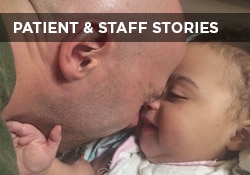This website uses cookies so that we can provide you with the best user experience possible. Cookie information is stored in your browser and performs functions such as recognising you when you return to our website and helping our team to understand which sections of the website you find most interesting and useful.

Susan E. Mazer, Ph.D. Blog
Thoughts and ideas on healthcare
Hi, and welcome to my blog! I'm Susan E. Mazer -- a knowledge expert and thought leader on how the environment of care impacts the patient experience. Topics I write about include safety, satisfaction, hospital noise, nursing, care at the bedside, and much more.
Nothing But Words: Does HCAHPS Truly Measure the Patient Experience?
June 24, 2016
 Contrary to what some might think, the patient experience movement wasn’t inspired by just one event or just one speech. It has a history, a kind of genealogy.
Contrary to what some might think, the patient experience movement wasn’t inspired by just one event or just one speech. It has a history, a kind of genealogy.
From Wikipedia: “The word patient originally meant ‘one who suffers’. This English noun comes from the Latin word patiens, the present participle of the deponent verb, patior, meaning ‘I am suffering,’ and akin to the Greek verb πάσχειν (= paskhein, to suffer) and its cognate noun πάθος (= pathos).”
So, the patient is the person who suffers and whose suffering caregivers are committed to relieving. This relationship existed long before curative medicine, insurance, or HIPPA.
What About Patient Satisfaction?
Patient satisfaction originated with the work of Irwin Press and Robert Ganey who developed a survey tool in the 1980s. It was the first time patients were asked whether they were “satisfied” with how their suffering was relieved.
According to Press, that movement went from being an effort to “gain useful information to improve care,” to an effort to measure and compare the patient experience. And the patient experience is not about satisfaction. Rather, it’s about what happened from the patient’s perspective.
The HCAHPS survey is, then, the instrument used to measure and quantify on a comparative scale, the state of what happens to patients when in the hospital. It asks about pain, but not about suffering.
It consists 32 multiple-choice questions that are sent out for response following a hospitalization. So, the patient doesn’t respond in real time, but rather as a memory, a recollection.
The HCAHPS survey leaves much unanswered. For example, it asks: During this hospital stay, how often did doctors treat you with courtesy and respect?
A patient might think, “What if the doctor treated me courteously and respectfully, but not often enough? I only saw him twice during my stay, so, not enough. Plus, the time I had was too short to ask questions. And, yes, he was nice, but I did not understand what he was saying to me.”
Patient Experience Goes Beyond Multiple Choice
The information that healthcare providers need to improve the patient experience isn’t found in the answers to the multiple-choice questions. Finding out what’s behind the answer is what is really important.
When scores are low in the “quiet at night” question, what does that mean? Does it really just mean that staff has to be quieter? Or does it also mean going beyond just providing a bed and turning the lights off to make the nights more comfortable?
The patient experience unfolds moment to moment over each 24-hour day. Given that HCAHPS is about a “look back,” patients will recall moments when they had strong feelings, good or bad.
They will recall events, perhaps not fully accurately, but whatever they remember happened is what happened for them. And, the 32 questions may not even touch what matters to them.
Don’t Ask If You Don’t Care
After I was in the hospital a few years ago, I did not receive an HCAHPS questionnaire. But I was called at least three times by someone asking about the quality of my care.
When I finally responded and described in detail about my experience as a patient, the person on the other end of the line said, “I am in Seattle. I do not know the doctor or the hospital. I will try to pass your message on.”
This was infuriating. Why ask if you don’t want to know? And don’t insult patients by having someone call who does not care.
Finding out about the patient experience is part of the patient experience. But it’s much more than just words on a survey or words spoken by a person over the phone.
It includes every attempt to find out what happened during their hospitalization, the response to that information, and how patients feel after sharing such personal information. How all of this is handled informs the next patient’s experience.
And, more important, it also verifies whether the hospital actually does care.
Worse than asking patients what happened during their hospitalization is ignoring what they say and leaving them without any evidence that what they shared matters.
So, in the end, all the HCAHPS questions are irrelevant to the patients who answer them. To the rest of us, they matter only to the degree that the patient matters. And, more critical, they matter only to the degree that the experiences shared by patients inform in action what HCAHPS asks in words.
P.S. If you like this post, please do me a favor and share on LinkedIn, Twitter, Facebook, etc. Also to get automatic notices when a new post is published, please subscribe below. No spam – just great content. Thanks!










